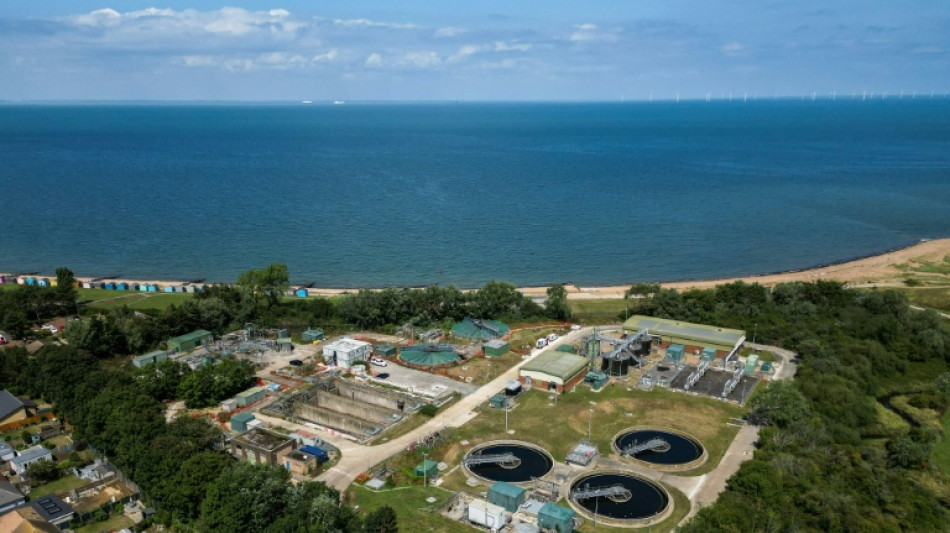

UK water pollution alarms summer bathers
Pensioner Chris Stanley became so incensed by water companies dumping wastewater into the sea near his home that four years ago he stopped paying his bills.
To his dismay things have not improved.
"They released sewage water last week on Friday, (and) Sunday night, and on Monday the beach was declared not safe for swimming," said Stanley, 82, a regular swimmer, whose home overlooks the sea from the southeastern town of Whitstable.
The Southern Water company, which supplies water to 2.6 million people, is allowed to release excess wastewater into the sea when the network is saturated such as during heavy rains.
But the situation has become so exasperating that in 2021 Stanley refused to pay part of his water bill relating to sewage treatment.
Last month a court ordered that Stanley must pay what he owes.
"The judge ruled that water companies have the right to claim the money even if they don't do it properly," he said wryly.
Many Britons have been increasingly alarmed by the water companies' failures and their lack of investment, with some customers launching a national campaign named "Boycott Water Bills".
Last year, a record 3.6 million hours of sewage discharges were registered in England, according to the government's Environment Agency.
Serious pollution contamination incidents also rose by 60 percent in a year, the agency said.
According to an investigation by environmental watchdogs Unearthed and DeSmog, 10,000 water quality tests had to be abandoned between May and July due to a lack of staff at the Environment Agency.
- System overhaul -
Labour Prime Minister Keir Starmer's centre-left government on Monday announced plans to overhaul the water regulation system after a scathing report by the Independent Water Commission.
It slammed private companies and authorities in England and Wales for failing to regulate the water sector.
"Our water industry is broken," Environment Secretary Steve Reed said.
The government will now abolish the much-maligned regulator Ofwat after the commission report, dubbed the most comprehensive review of the sector since its privatisation in the late 1980s.
On Wednesday, the first day of the school holidays, a few families were playing in the sunshine enjoying Tankerton's pebble beach on the Kent coast, lined with colourful beach huts.
Near a Southern Water treatment station, where a long pipe travels under the beach into the sea to release wastewater, some holidaymakers were even bathing.
The water company had dumped polluted water into the sea for six hours the day before, but swimming was still permitted.
Yoga instructor Lisa Lawton from London was enjoying a week's holiday in Whitstable with her two daughters.
"They were released last night? I was not aware. I just wanted to go for a swim," Lawton, 41, told AFP, referring to the discharges.
Another mum, Emily Winstone, 42, said: "When we used to come here as children, you didn't ever think about it."
"But now it's every time you come to the beach, it's the first thing you think of. Can we go in the water?" she said.
- Renationalisation -
The charity Surfers Against Sewage has created a phone app that indicates the water quality on UK beaches.
Last year, they received 1,850 reports of people falling ill after swimming in the sea.
Elane Heffernan, who volunteers with the campaigning group SOS Whitstable, became sick after bathing close to sewage spillages in 2021.
That year, the town's oyster farm shut down and Southern Water was fined 90 million pounds ($121 million) for admitting to 7,000 illegal discharges between 2010 and 2015.
Since then, Heffernan has advocated for the renationalisation of the water industry, and a petition launched by SOS Whitstable was signed by more than 280,000 people.
"We have now had more than enough evidence over 30 years to know it (privatisation) doesn't work. It can't work. It's never going to work," said Heffernan, adding private companies prioritised profit over long-term investments.
A spokesperson for Southern Water told AFP the discharges "are not acceptable and we have a £1.5 billion plan (by 2035) to drastically cut their use by using innovative nature-based and engineering solutions which keep rainwater out of our sewers".
They added that the company had also invested 965 million pounds last year.
But according to the National Audit Office, the entire water sector needs some £290 billion in investment over the next 25 years.
T.Hokulani--HStB






